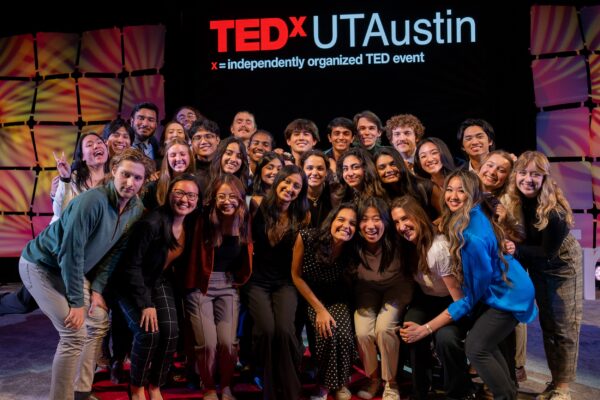TED Talks were first posted online in 2006, the year many current college freshmen were born.
So today’s college students cannot remember a time before the acronym, which stands for technology, entertainment and design, was a household word. They grew up with TED Talks — highly curated, well rehearsed, thought provoking and often inspirational — as the standard for lectures and the source of, as the slogan goes, “ideas worth spreading.”
It was natural, then, that when the platform began to expand rapidly with the introduction of TEDx conferences, which follow the formula but are independently organized, UT students wanted to be a part of the phenomenon. In 2017, a group approached the office now known as University Marketing and Communications for institutional sponsorship, and the first TEDxUTAustin Conference, organized by students, was held the following spring.
This Saturday, March 23, marks the 7th Annual TEDxUTAustin Conference. It will be held in the newly renovated Hogg Memorial Auditorium from 9 a.m.-5 p.m.
This year’s conference, called Mosaic, will feature 10 speakers:
Melody Afkami, CEO of Melody DanceFit
Nahid Siamdoust, UT Assistant Professor and Journalist
Bavu Blakes, Musician and UT Alumnus
Kareem El-Gayesh, Founder of KG BBQ
Kathy Terry, Cofounder of P. Terry’s restaurant chain
Caroline Rose, Cancer Survivor, Motivational Speaker, and UT Alumna
Alexis Kashar, Civil Rights Attorney and UT Alumna
Richard Reddick, Dean of Undergraduate Studies at UT
Merlin Tuttle, Ecologist and Conservationist
Heather Morgan, Chief of Staff and Strategy of Alamo Drafthouse
Half of the tickets, available here, for the roughly 1,000-seat venue are reserved for UT students and are $20. The remaining tickets are available for $40. All ticket holders get access to a full day of speakers, the Showcase featuring business startups, lunch and an art gallery at the conference.
***
Arjun Rao, a business honors and finance senior serving as president of the group, helps coordinate the 36 students who form the Executive Team and six committees, including communications, creative, curation, finance and logistics, operations, and partnerships.
Rao’s first year at UT was during COVID and was online. “I was simply looking for something to do while I was at home. I joined not expecting too much from it, but I immediately saw how much responsibility was given to college kids, and that’s what really drew me into it.”
In the years that followed, he says he saw how much of an impact it made, the boost it gave to “really amazing people a UT and the Austin community.” Far beyond merely those who attend, millions of people have watched the talks on YouTube. “It’s just really cool to give people a platform to spread ideas that they’re genuinely passionate about.”
Naimisha Vunnam, a junior serving as vice president for partnerships, says, “A lot of people don’t know that we’re student run, and that’s really integral to all we do.” As a public health major, joining the Partnerships Committee was something completely out of her comfort zone, she says, and that was the attraction. “It had nothing to do with what I was involved with in my classes or other organizations or the field I was going into.”
Everything is student produced and student run. “Every graphic you’ll see was done by students,” says Rao. “Every speaker that you’ll see has been recruited by students.”
Rao recalls that his freshman year he was responsible for coordinating the audio-visual needs. “I was talking to the director and the camera people and making sure everything was good to go, which is kind of weird for an 18-year-old who had done nothing like this in his life. I have a lot of terminology in my head from the last four years I would not have expected to know,” he says with a laugh.
“There’s truly so much diversity within the team and the people that we work with, says Vunnam. “We have so many majors, so many classifications, and even more than that, the speakers that we work with and the different parts of Austin we connect with are truly intellectually stimulating as well.”
The fall semester includes much fundraising. “We work with the pretty large budget, so we have to reach out to a lot of our past partners,” says Vunnam. They work with University-based partners such as the colleges and departments but also bring in corporate partners, past examples being Red Bull, Microsoft and Dell.
During the spring, they work on a “showcase,” selecting startup companies through Capital Factory, a Texas-based venture capital firm, who then get booths at the conference.
Rao says that as president this year his hands are in every pot. He jumps from working with speakers to planning logistics and AV to sitting in partnership meetings with Vunnam. “My workload has definitely skyrocketed this year,” he says. “I’m not dedicating any less than 10 hours a week to TED, and as we get closer to the conference, it’s more like 25.” It’s a small team, he says, “but that allows us to be accountable and honest with each other. If someone has a test or some other work, we don’t tell them not to do it so they can work on TED. We really just encourage everyone to talk to each other to make sure that someone is there to pick up the slack.” His nine-hour class load, a function of his senior status, helps with the balance.
The first year, in 2018, there were 100-200, so the conference was held in the Mulva Auditorium in the Engineering Education and Research Center. Since 2022, they have been getting closer to 800. In 2022 it was in the ballroom of the AT&T Hotel and Conference Center, and last year was in the LBJ Library Auditorium.
Rao says he always emphasizes to people who are interested in joining the group that they do not care about participants’ majors or career aspirations. “It’s just about what interests you.”




